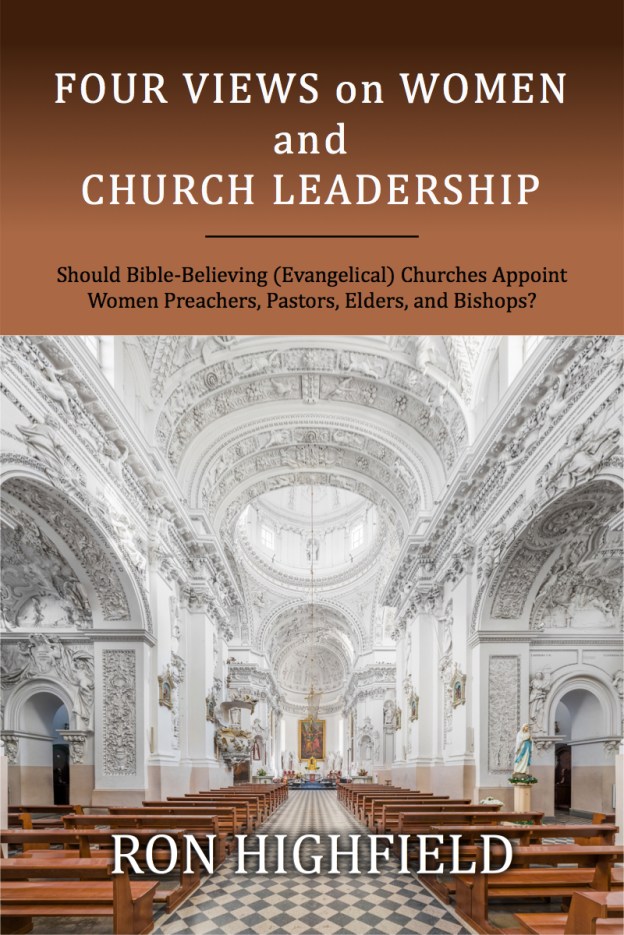Highfield Takes a Unique Perspective on Women in Leadership for Conservative Churches
Ron Highfield. Four Views on Women and Church Leadership: Should Bible-Believing (Evangelical) Churches Appoint Women Preachers, Pastors, Elders, and Bishops? Keledei Publishing, 2017. Pbk ISBN: 978-1-946849-08-3. eBook ISBN: 978-1-946849-09-0. 112pp.
Should conservative churches appoint women to the offices traditionally reserved for men? Many writers are calling for such changes; others oppose them. Are these proposals inspired by a deeper understanding of the gospel of Christ as their defenders claim? Or, are they inspired by contemporary secular philosophies as their opponents allege? Ron Highfield explores these and other questions in Four Views on Women and Church Leadership. In this book, Highfield stages a discussion in which three fictitious characters explain and defend their viewpoints and critique opposing views. The three views are Secular Feminism, Evangelical Egalitarianism, and New Complementarianism. In a fourth view, Highfield charges that the entire debate is based on a defective view of the church. He challenges the gratuitous assumptions that make the discussion necessary and meaningful: the church is a public institution, the ministry is a profession like other professions, and believers assemble to experience a performance. This book’s brevity, non-technical nature, and its questions for discussion at the end of each chapter make it ideal for private study, small group discussions, Sunday school classes, and undergraduate courses.
Endorsements for Four Views on Women and Church Leadership
”Ron Highfield has given a fair statement of different views, their strengths and weaknesses, on the important and controversial topic of female-male relations. His work is a reminder that more is at stake than the correct interpretation and application of Biblical texts, as important as those are. The theology of human nature has philosophical and practical implications for individual human life, the future of the human race, and human society at large. Out of the countless books and articles on women in the church, this book for its sound common sense and Biblical and theological depth is a must read.”
—Everett Ferguson, Professor Emeritus, Abilene Christian University
”This book is an interesting treatment of the various viewpoints concerning women as leaders in the church. It may surprise you and make you think differently about the issue. It may also help you better define your own feelings about the issue. I highly recommend it.”
—Jane Petty, Dickson, TN
”I learned from both Major League Baseball and Orthopaedic Surgery that the importance of following soundly established principles and best practices cannot be underestimated. The contemporary church is embroiled in a battle with our dominant Western culture in no less significant ways than was the primitive and early church with its culture. Professor Ron Highfield cleverly investigates the contemporary church-culture relationship by examining the current debate concerning the proper and acceptable role of women in the practice, preaching and leadership of today’s church. Ron uses an imaginary debate between three fictitious characters as a literary device to tease out the issues involved. Each of these characters represents a different contemporary position and idea on the role of women in today’s church. In the imaginary debate, he allows the reader to work through the issues and principles that are involved. The perceptive reader will see that the issues are fundamentally very simple; yet, they are profoundly important for today’s church. This very readable “little book” explores the nature of being human, the church and its authority. It allows the reader to see that progressive culture is fundamentally attacking one of the bedrocks of the church—especially, the inspired and authoritative Scripture. The role of women within the church is a symptom of the problem; it is not the problem or diagnosis. This is an important treatise for the church to read and understand.”
—Gail E. Hopkins, MD, PhD
Availability of Four Views on Women and Church Leadership
Four Views on Women and Church Leadership is available now in paperback and eBook at retailers worldwide.
To order, and for more information, visit https://sulisinternational.com/product/four-views-highfield/.
To request review copies, visit https://sulisinternational.com/request-review-copy/
About the Author. Ron Highfield (PhD, Rice University) is Professor of Religion at Pepperdine University, Malibu, California. He is the author of Great is the Lord: Theology for the Praise of God (Eerdmans, 2008), God, Freedom & Human Dignity: Embracing a God-Centered Identity in a Me-Centured Culture (Intervarsity Press, 2013), The Faithful Creator: Affirming Creation and Providence in an Age of Anxiety. (Intervarsity Press, 2015), and a contributor to Four Views on Divine Providence (Zondervan, 2011).
About Keledei Publications. An imprint of Sulis International, Keledei has been publishing non-fiction titles in spirituality, practical theology, Bible studies, ministry, and the Christian life. These works offer high-quality resources for individual Christians, the church, and those with interest in practical religion and faith. Keledei Publications also offers reprints of works in those areas, especially older titles that are not readily available in print or eBook form.
For information on submitting manuscripts, visit [https://sulisinternational.com/submit-a-manuscript/].
For more, contact Sulis International.
publications@sulisinternational.com
www.sulisinternational.com
+1 805-910-7714
